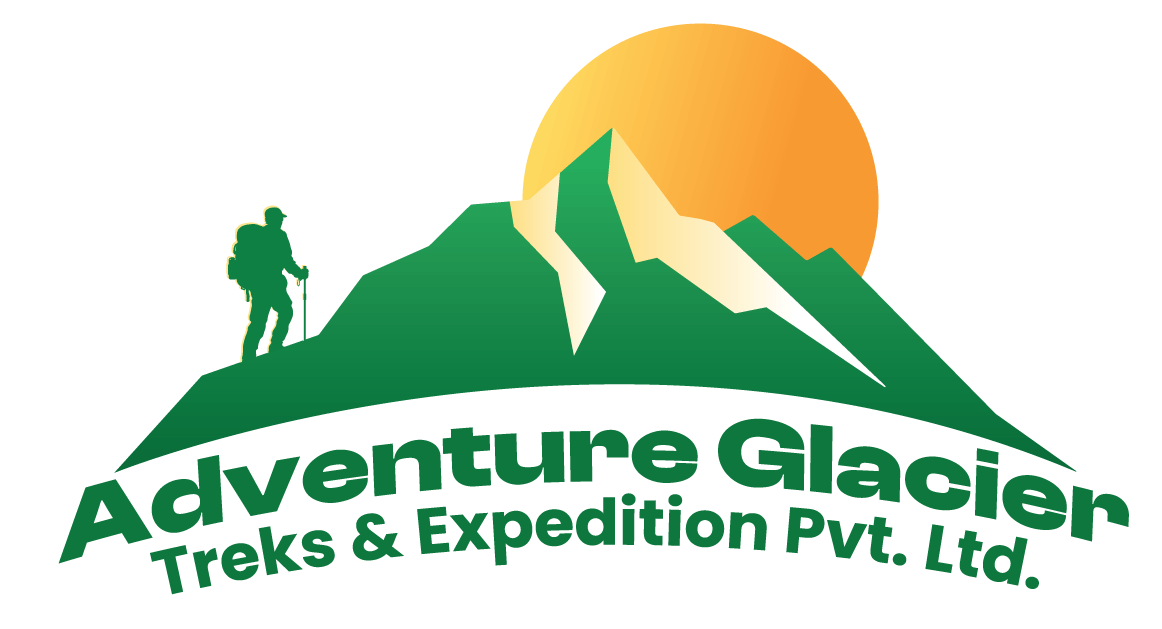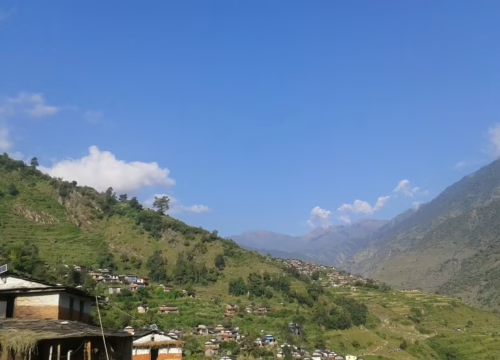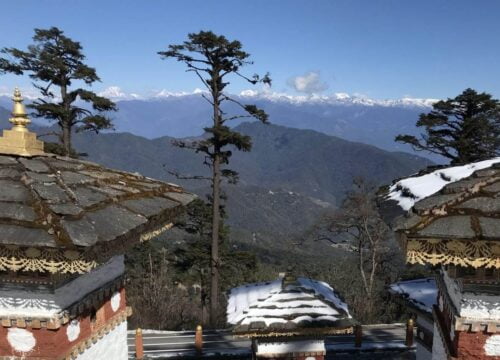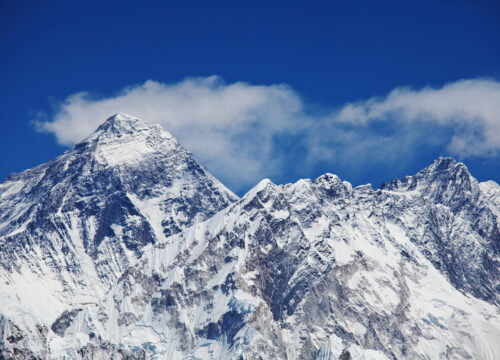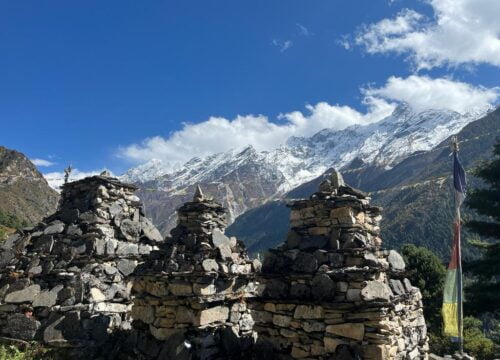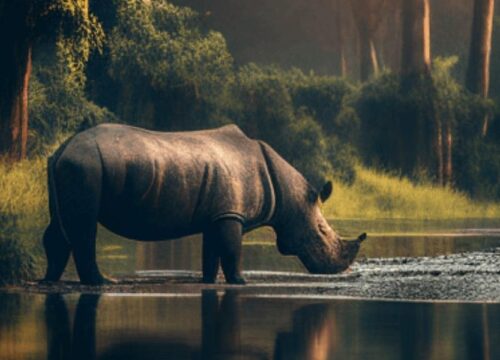Upper Mustang Trek
Trip Overview
The Upper Mustang trek is among the most exciting, cultural, and untouched places located in the Himalayan region. With an elevation of 3,900m, this trek offers astonishing views of majestic mountains such as Dhaulagiri, Annapurna I from the close range while Nilgiri, and Tilicho peaks from the far distance. Upper Mustang Valley is referred to as the “Forbidden Kingdom”. This trek is also considered the world of stark beauty and ancient mystique. The Upper Mustang region was closed to outsiders till 1992 AD. This journey leads you across the dry and breezy terrain where you can observe the sandstone spires, deep river gorges, and high cliffs.
Your journey begins in Jomsom, where the Kali Gandaki River flows through the earth’s deepest canyon. As you trek towards the north, you will notice the change in land structure, such as desert-like areas similar to the Tibetan Plateau. The path leads past the caves with cliff faces, historic trade paths, and uneven moraine terraces. After several days of hiking, you arrive at the center of Upper Mustang (Lo-Manthang) – a walled city from the medieval period governed by a hereditary monarch. In this place, there is an old museum that is fully surrounded by walls. Additionally, the monasteries can also be found in the location. In these monasteries, the sound of monks chanting prayers and mantras can be heard. You can also explore the sky caves – a mysterious chamber that serves as a meditation place. Additionally, you can find lots of prayer wheel spins, mani walls that are carved with sacred mantras, and fluttering prayer flags during the trek. By exploring these places, you may feel that you have stepped into the forgotten chapter of Himalayan history.
This trek is moderately to strenuous as you need to trek at an altitude of 3,990 m. So, you need a proper acclimatization for this trek to successfully complete it. You should have sturdy gear to protect from strong winds and cold nights. To perform this trek, it is mandatory to have a special restricted area permit (USD 500 for 10 days) and a Mustang Conservation Area Permit (MCAP).
The Upper Mustang trek offers a solitude environment. There is no teahouse found during the trek, so you need to spend the night in traditional village homestays. Inside the homestay, you can find basic amenities such as electricity and lighting facilities, Wi-Fi facilities, basic cleaning supplies, and safety features. This journey is not just about trekking in different places; this trek is also about exploring a land suspended between myth and reality.
Trip Itinerary
Your journey commences once you arrive at the first international Airport of Nepal (TIA), Kathmandu. While heading towards Kathmandu through the scenic flights, you may get too excited to explore the places. You will come to Kathmandu to have a wonderful memory that can be unforgettable, such as magnificent views of snow-capped mountains, the world-class view of temples and chortens, and the unique, traditional, rich culture. To experience all those, our representatives will help you. Firstly, our representatives and our driver will be there at the arrival gate of the Airport to greet you and transfer you to your hotel. After that, we will welcome you to the traditional dinner with us to have a short introduction about us. Then, you will go to sleep.
- Accommodation: Tourist Standard Hotel in Kathmandu.
On this day, you will fully explore Kathmandu - the vibrant city of Nepal. As Kathmandu is well-known for tourism, many tourists come here to explore the historical and cultural treasures. In this city, you can find Tibetan Buddhism, Hinduism, and some Western culture coexist peacefully while trekking. The neighbouring cities of Kathmandu (Lalitpur and Bhaktapur) hold significant historical, cultural, and religious value. So, you will also visit those cities along with Kathmandu. The first half day will be spent in your hotels by managing the gears, permits, breakfast, and other activities. So, the other half day will be spent exploring the well-known and holy Hindu shrines. It includes the Pashupatinath - a sacred Hindu temple, Boudhanath - the largest Buddhists stupa in Nepal, and the Swoyambhunath - one of the oldest stupas in Nepal. Additionally, you will also visit many tourist destinations such as the 3 durbar squares of Kathmandu valley and the Garden of Dreams. At night, you will return to your hotel, where you will eat a delicious dinner and stay overnight.
- Highlights: Exploring Kathmandu's famous temples and cultural sites, including Pashupatinath, Boudhanath, Swayambhunath, and the Durbar Squares.
- Accommodation: Tourist standard hotel in Kathmandu.
After breakfast, you will continue your Upper Mustang trek towards Pokhara either by road or by air. You can take a tourist bus to travel, which takes around 6-7 hours. Alternatively, you can choose air transportation to reach Pokhara in 25 minutes, but you need to pay an extra 97 euros ($118). If you are interested in road travel, you can take a private car at the same extra cost. This all depends upon your group size. Traveling by ground transportation allows you to take in the breathtaking views of the surrounding hills, the Trishuli River, and the Kathmandu Valley on a scenic drive. After a few hours of a picturesque drive, you will finally reach Pokhara - one of the popular visited tourist sites in Nepal. Once you reach Pokhara, you will check into your hotel and rest there. After taking a rest, you can go for exploring the Pokhara city by visiting areas such as Phewa Lake, Gupteshor Cave, David Falls, Mahendra Cave, and Sarangkot if you are interested.In the evening, you will go back to your hotel, where you will have dinner and stay overnight.
- Highlights: Scenic drive to Pokhara and exploring the tourist destinations like Phewa Lake and Sarangkot.
- Accommodation: Comfortable hotel in Pokhara.
This day signifies the start of your trekking journey. Following the early breakfast, you will have an amazing morning flight towards Jomsom, a place famous for apple farming. At Jomsom, our trekking crew will be waiting for you at the arrival gate at the Airport. After you meet with our trekking crew, your trekking journey begins towards the beautiful settlement of Kagbeni. You need to traverse the high suspension bridge before proceeding along the Kali Gandaki's bank. The paths are primarily downhill, serene, and deserted, scattered with wrinkled stones and sand. This makes you feel relaxed and calm. While trekking, you witness the breathtaking views of mountains such as Dhaulagiri, Tukuche, Nilgiri, and Annapurna. After a few hours of trekking, you will reach Kagbeni (2,780m). Kagbeni is the village that serves as the gateway to Upper Mustang. There, you will enjoy a tasty dinner and spend the night.
- Highlights: Travel from Jomsom to Kagbeni by witnessing breathtaking mountain views.
- Trek Duration: 3 hours / Distance: 10 km
- Accommodation: Homestay in Kagbeni.
Once you have an early breakfast, you will begin your Upper Mustang trek towards the Chhuksang (2,920m). While trekking, the trails become much wider and turn into a long stretch of sand. Meanwhile, the trails are interesting as you watch mule trains carrying goods from Mustang and Tibet pass by ahead of you. During your trek, you will also encounter the river alongside the monasteries. At the west bank of the river, you will find several caves and Gompa Kang. The Gompa Kang is a part of the Nyingmapa Buddhist tradition, but most monasteries in Upper Mustang follow the Sakyapa tradition. After a few hours of trekking from the bank of the river, you will reach Tangbe, where you will take a short break and eat a delicious lunch. At the same time, you will also witness the distinctive black, white, and red Chortens of Upper Mustang. The Tangbe is a small village that has narrow streets like a maze, amidst by white-painted houses, and fields of buckwheat and barley, and apple orchards. From these hamlets, you will observe the awe-inspiring view of Nilgiri peak. After trekking for two hours to Tangbe, you will reach Chhuksang Village, where you will be provided with a delicious dinner. Then you will spend the night there.
- Highlights: Trek to Chhuksang with stunning views of Nilgiri peak and traditional Mustang villages.
- Trek Duration: 5-6 hours / Distance: 20 km
- Accommodation: Homestay in Chhuksang.
After breakfast, you will commence your trek. You will notice that the more you trek at higher altitude places, the fewer settlements are seen due to changes in geography as well as in civilization, lifestyle, and people. You will see that most locals of Lo or Mustang are engaged in farming sectors. However, the locals only do farming in certain areas where there will be sufficient water and rich soil. The terrain that you will trek is dark with green patches. From this point, you are unable to trek beside the Kali Gandaki River. Upon reaching the river, you will find a steel bridge spanning it, positioned directly in front of the tunnel. From here, you will ascend through the rocky area to arrive at Chele. You need to be careful while trekking in the area because you will find aggressive Tibetan mastiffs that are tied up at some of the houses. From this place, you will trek through a rocky hill before trekking up to the wall of a steep canyon. Then, you will reach the pass. After that, you will descend on a nice trail towards Samar (3,290m). This place is located in the poplar tree forest. You can see horses and mules resting here. At night, you will eat a delicious dinner and rest here.
- Highlights: Crossing the Kali Gandaki and reaching Samar through rocky hills and a canyon pass.
- Trek Duration: 4-5 hours / Distance: 16 km
- Accommodation: Homestay in Samar.
In the morning, you will receive breakfast. After that, you will trek towards the mountains that are above Samar. Next, you will go down into a vast gorge where you will encounter the chorten. Subsequently, you will hike to a different valley featuring the juniper trees. Then, you need to cross the Taklam La pass. Upon crossing the pass, you will go down close to the Shyangmochen ridge - a small settlement with a handful of tea shops. Close to Shyangmochen, you will find Rangbyung - a cave with a rock that protrudes from the earth, resembling chortens. You will visit Rangbyung cave too. After that, you will return to Shyangmochen. From this place, the trail will rise, but you won;t find it difficult to trek. Slowly, you will reach another large valley before arriving at Geling (3,440m). In this valley, you will observe the large area that is filled with barley crops. After trekking for a few hours, you will reach the Geling, where you will witness the house painted with white and ochre. These houses are mainly built using clay and stones. You will also find the branches and straw that are constructed in the roofs. Then, you will find your homestay where you will eat dinner and stay overnight.
- Highlights: Visiting Rangbyung cave and crossing Taklam La pass before reaching Geling.
- Trek Duration: 5-6 hours / Distance: 15 km
- Accommodation: Homestay in Geling.
Following breakfast, you will continue your Upper Mustang trek. After checking out your homestay, you will commence by ascending through the fields and up into the middle of the valley. After that, you will traverse from the small village of Tama gun while witnessing the beautiful chortens. Next, we climb via the difficult route along the upper part of the valley to arrive at the Nyi La Pass (3,840m). From Nyi La pass, you will descend through the tranquil environment. You need to trek for around 30 minutes to reach the junction where you will find 2 paths (right and left). If you trek from the right path, you will reach Charang. Furthermore, if you choose to trek from the left path, you will reach Ghami (3,460m). So, you will select the left path to reach the destination (Ghami - a large village that is covered by whitewash and protected cliffs) on this day. After that, you will find your homestay. In the evening, a delightful dinner will be provided, and you will spend the night.
- Highlights: Pass the Nyi La Pass (3,840m) and descend into the serene valley to arrive at the picturesque village of Ghami.
- Trek Duration: 5-6 hours / Distance: 9.3 km
- Accommodation: Homestay in Ghami.
After an early morning breakfast, you will start your trek to Upper Mustang, heading towards Charang (3,490m). On this day, you will spend all of your energy and feel too exhausted because you will trek in the driest part of Mustang, where the ground is loose and arid enough. Although the trek is challenging, you will be amazed by the breathtaking views of the hills in the north and the mountains in the east and west. Following several hours of hiking, you will reach Charang Chu canyon. To the east of the village, you will see the impressive dzong and the red Gompa, showcasing a beautiful collection of statues and thangkas. After that, you will reach your homestay, where you will eat dinner and spend the night.
- Highlights: Explore the arid terrain of Mustang and tour Charang's fortress along with the red Gompa.
- Trek Duration: 3-4 hours / Distance: 10.7 km
- Accommodation: Homestay in Charang.
Following your breakfast, your first activity will be to discover the delightful village of Charang in the morning. You will visit the jaw-dropping monastery while exploring Charang hamlets. Following that, you'll walk gradually up the slope above the valley featuring a prominent chorten that delineates the border between Lo Manthang and Charang. After that, you will start your hike to Lo Manthang (3,730m). While trekking, you will notice that the path is wider, and at its end, you will catch a glimpse of Lo Manthang's walled city. After that, you need to trek for a few hours to reach the gate located at the northeast corner because Lo Manthang has only one gate to enter this place. After arrival, you will take some rest and start to explore the city deeply. At night, you will return to your hotel. At the hotel, you will eat a mouthwatering feast and stay overnight.
- Highlights: Explore the charming streets and monastery of Charang and trek to the walled city of Lo Manthang.
- Trek Duration: 2-3 hours / Distance: 11 km
- Accommodation: Hotel in Lo Manthang.
This day is allocated to explore the nearby places of Lo Manthang and to adjust to the high altitude. After breakfast, you will begin to discover the delightful village of Lo Manthang. You will find around 150 homes (excluding Lama's home) in these villages. Additionally, you will find 4 main temples. One of the temples is Champa Lhakang. Inside this, there is a large clay Buddha statue and artistic mandalas that are painted on its walls. You will also witness the impressive King's Place, where the king and queen live. The majority of residents in this area hold great respect for the king, even though the king mostly has ceremonial duties. The villagers of the kingdom still seek advice from the ceremonial king on various topics. If you have less time or don't want to trek to explore this village, you can hire a horse to visit, but it can cost extra money. At night, you will return to your hotel. Following that, you will have a tasty dinner and spend the night.
- Highlights: Exploring Lo Manthang's temples, including Champa Lhakang, and visiting the king's palace.
- Accommodation: Hotel in Lo Manthang.
From this day, your journey back begins via the elevated highland path. After breakfast, you will begin your journey to Ghami, which you visited a few days ago. On your way back, you will see the breathtaking sights of Charang Valley and Lo Manthang. Furthermore, you can also observe the stunning snow-covered peaks in the distance. After a few hours of trekking, you will reach Lo Gekar. (3,460m). On your journey, you will arrive at Ghar-Gompa, also known as Gekar Monastery, the most ancient monastery in Mustang, located just after the Lo Gekar village. When trekking by following the highland route, you need to pass the alpine meadows before descending steeply through the ancient gully to reach Dhakmar. Here, you will stop for a while to eat the delicious lunch. After having lunch, you will continue your trek along the lovely valley before you ascend to the ridge. Upon climbing the ridge, you will go down for several hours to arrive at Ghami. After reaching there, you will rest at your homestay. In the evening, you will have a meal and stay overnight.
- Highlights: Journey back to Ghami via Lo Gekar and explore Ghar-Gompa.
- Trek Duration: 6 hours / Distance: 12 km
- Accommodation: Homestay in Ghami.
Following breakfast, you will begin your Upper Mustang trek towards the Chele. You will trek from Gham towards the Shyanboochen on the lower trail while witnessing the panoramic views of majestic mountains such as Dhaulagiri and Nilgiri. In between the trail, you will also observe the Rachen Gompa - one of the oldest and most picturesque monasteries in the region. If you are interested in visiting, you are allowed to explore the Gompa. This mysterious Gompa was built in a rising rocky cave. After trekking a few hours from Shyanboochen, you will reach Samar and then continue the trail towards Chele. Upon arriving at Chele, you will relax, have dinner, and sleep for the night.
- Highlights: Trek to Chele with sights of Dhaulagiri and Nilgiri, and explore Rachen Gompa.
- Trek Duration: 7 hours / Distance: 16 km
- Accommodation: Homestay in Chele.
After having breakfast, you will continue your trek towards Muktinath. You need to step back towards the Chhuksang before trekking from the upper road towards the Muktinath, a Hindu shrine that is located at the summit of the tallest peak (3,900m). You can see lots of pilgrims walking towards the Mukatinath temple with bare feet. Explore the Muktinath temple (a religious temple in Nepal), or you can simply trek towards Kagbeni by following the same route you took earlier. Upon arrival, you can relax in your homestay and have dinner in the evening. Following the dinner, take enough rest and sleep.
- Highlights: Trek to Muktinath, a sacred Hindu shrine at 3,900 m, or optionally head to Kagbeni.
- Trek Duration: 6 hours / Distance: 16 km
- Accommodation: Homestay in Kagbeni.
This day marks the concluding day of your trek. Following breakfast, you will trek back towards Jomsom. During the trek, you will enjoy the view of arid river valleys, terraced fields, and traditional villages. After trekking for a few hours, you will arrive at Jomsom, where you will check into your hotel, take a hot shower, and relax the whole day. During the evening, you can interact with our porter and the sherpas by sharing stories, reflecting on the best moments during the Upper Mustang trek. After that, you will spend the night.
- Highlights: Final trek to Jomsom with views of valleys and villages.
- Trek Duration: 3 hours / Distance: 9 km
- Accommodation: Hotel in Jomsom.
Day 16 marks the final day of your adventure. After early breakfast, you will take an early morning flight towards Pokhara - a city known for its tranquil lakes and breathtaking mountain views. After the 25-30 minutes flight, you will finally reach Pokhara. Upon arriving, you can rest, and relax. If you are interested, you can explore tourist destinations such as World peace pagoda, old Bazaar, Tibetan monasteries and Bindhyabasini Temple. From this city, you can witness the breathtaking views of Kali Gandaki Valley, Nilgiri, and Dhaulagiri ranges. If you are not interested, you can stay at your hotel and rest your legs. At night, you will be served with a delicious dinner. This dinner is your last with us. After that, you can spend your night.
- Highlights: Fly to Pokhara and enjoy its serene lakes, mountain views, and cultural sights.
- Accommodation: Comfortable hotel in Pokhara.
FAQs
What is the best time to explore the Upper Mustang trek?
The best time to explore the Upper Mustang trek is during the Spring (March, April, and May) and Autumn (September, October, and November) seasons. In these seasons, the paths are dry and secure, the climate is enjoyable, skies are clear, flowers are blossoming, and visibility is great.
How much is the permit for the Upper Mustang trek?
Three permits are required to trek in Upper Mustang. They are as follows:
- Restricted Area Permit (RAP): $500 for the first 10 days (An additional $50 for each extra day).
- Annapurna Conservation Area permit (ACAP): NPR 3000 (around $25).
- Trekker’s Information Management System (TIMS): Group trekkers pay $10, while individual trekkers pay $20.
What makes the Upper Mustang trek attractive to most tourists?
The Upper Mustang trek is very attractive to most tourists because of the following reasons:
- Dramatic landscapes
- Ancient Tibetan culture
- Historic sites
- High-altitude experience
- Peaceful and less crowded
What essential gear should you have for the Upper Mustang trek?
For trekking in Upper Mustang, it is necessary to have important equipment like:
- Waterproof and windproof jacket and pants
- Thermal base layers
- Hat and gloves
- Sturdy and comfortable trekking boots
- First aid kit
- Duffel
How difficult is the Upper Mustang Trek?
The Upper Mustang trek is generally hard to moderate, as it involves trekking at high altitudes (up to 3,900m), trekking long days and being faced with limited amenities during the trek.
What if I cannot continue trekking due to exhaustion?
If you cannot trek due to exhaustion, you can take a rest at homestay or hotel if needed. Additionally, you may hire a porter or guide to assist you, shorten the day’s trek, arrange for emergency evacuation if necessary, and ensure you stay hydrated and refuel along the way.
Why Choose Adventure Glacier Treks?
- Expert Guides: Our expert guides have reached the top and know about the area well enough.
- Good Reviews and Reputation: Many trekkers return back to us for the journey in the Himalayas because of our experience, warm hospitality, and good memories.
- Safety First: The Adventure Glacier team focuses on the health and safety of a trekker during trekking. If needed, our team offers quick emergency services.
- All-Inclusive Packages: We manage all aspects, from permits to transportation.
Book Now
Price Includes
- Airport transfer services (pick-up and drop-off).
- Stay 2 nights in an accommodation in Kathmandu and Pokhara in a tourist standard hotel.
- Delve into the Pokhara and Kathmandu valley thoroughly with our expert guide in a private car.
- All-inclusive trek packages, such as ground transportation, required permits (including special permits), entrance fees, a professional trekking guide, porter services, and their expenses, such as insurance and equipment, are covered.
- Lodge accommodation along the trekking route.
- Three meals daily (breakfast, lunch, and dinner) accompanied by tea or coffee.
- Domestic flight tickets from Jomsom to Pokhara for the trekking team and the guide.
Price Excludes
- None of the alcoholic beverages is included according to the itinerary.
- Tips for your guide and porter are not included as per the itinerary.
- The schedule fails to include detailed travel and health insurance.
- Costs for personal and everyday use, like laundry, phone calls, and battery charging, are not specified according to the itinerary.
- Foods in Kathmandu are not covered.



